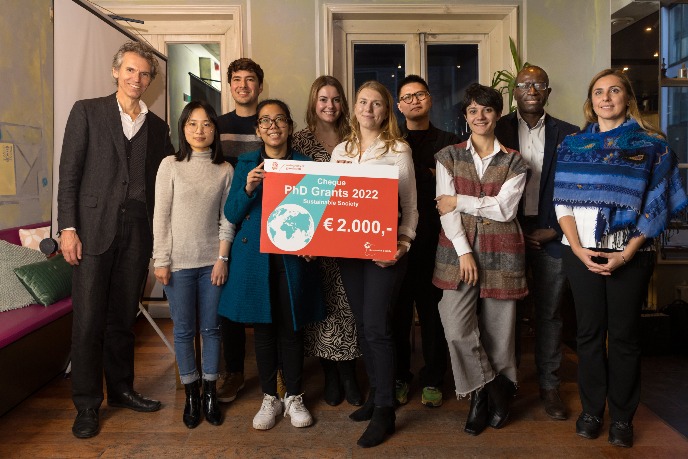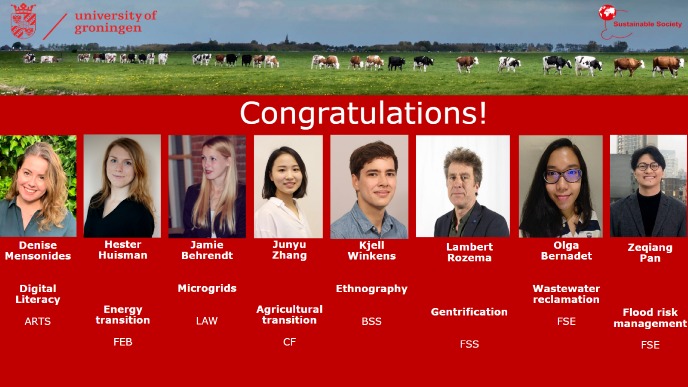Sustainable Society PhD Grants 2022 awarded to the eight winners

On Thursday 24 November our PhD Grants 2022 were awarded to the eight winners. The PhD Grants ceremony 2022 was held in Land van Kokanje. Every year we award 8 grants of 2000 euros. This grant enables PhD candidates to broaden their horizon and give their research output an extra push
We congratulate
-
Zeqiang Pan (FSE) - more
-
Kjell Winkens (BSS) - more
-
Hester Huisman (FEB) - more
-
Denise Mensonides (ARTS) - more
-
Olga Bernadet (FSE) - more
-
Jamie Behrendt (LAW) - more
-
Junyu Zhang (CF) - more
-
Lambert Rozema (FSS) - more
Bonus Price
During the Ceremony the winners had the opportunity to pitch their research for the jury and an audience. At stake: a bonus prize of €1000,- for visualization of the research. The best and most persuasive pitch was selected by a vote of the members of the jury, together with the grant winners.
Denise Mensonides (ARTS) received the bonus prize worth a €1000,-, which she can spend on visualizing her research by a professional designer.
22 applications. The 8 winners are from 7 faculties
Every year it is one of our highlights. And every year, UG PhD students amaze us with the quality of their research and pitches. Not to mention their enthusiasm. All of this made the presentation of our PhD Grants this year another great festive event.
Sustainable Society awards these Grants to stimulate PhD projects/students projects that are explicit contributions and/or solutions towards societal and sustainability challenges.
This year we received 22 applications. The 8 winners are from 7 faculties.
The Jury
The four members faced the difficult task to pick eight that they think are the bassociateest.
Members of the Jury
-
Dr. Başak Bilecen, Rosalind Franklin Associate Professor of Sociology (Faculty of Behavioural and Social Sciences)
-
Dr. Joram Tarusarira, Assistant Professor Religion, Conflict and Peacebuilding (Faculty of Theology and Religious Studies)
-
Selen Eren, PhD Researcher (Campus Fryslan)
-
Drs. Jolijn Creutzberg, Owner of Vanhulley and alumna (Faculty of Economics and Business)

More on the Grant winners and their research
Zeqiang Pan - Interaction between formal and informal actors in the shadow of flood policy-making. Comparative studies from China and the Netherlands.
My research explores possible solutions for sustainable flood risk management required by policymakers around the globe. The goal is to study the collaboration of local authorities and residents in the flood risk management in Guangzhou in the Pearl River Delta (PRD) of South China and Rotterdam in the Rhine–Meuse–Scheldt Delta (RMSD) of the Netherlands. The grant will be spent to conduct four community- level case studies with around 60 semi- structured interviews. With the support of the Sustainable Society PhD Grant, two stages would be conducted to progress the research.
In the recent decade, policymakers gradually identified that technical approaches were inefficient in flood protection in delta areas where local context and locally involved actors proved relevant. This tension between generic top-down policy and the potential of local situation-specific policy is the starting point of our research.
Through comparative case studies selected in the delta cities of Guangzhou, China, and Rotterdam, the Netherlands, my research contributes to exploring the possibilities of mutually learning for China and the Netherlands in sustainable flood risk management.
Kjell Winkens - Transitioning to adulthood as an unaccompanied refugee adolescent.
In my research, I look at the experiences of unaccompanied refugee adolescents while they transition to adulthood in the Netherlands. By conducting regular interviews and following them for an period of two years, I am mapping (changes in) their aspirations, influences from their social network, and challenges and opportunities they encounter as they prepare themselves for an independent future. Currently, I have been following a group of Syrian adolescents for half a year.
Through this grant, I would like to expand my research project with adolescents from different countries of origin and different prospects of receiving a refugee status. Since factors such as aspirations, responses to challenges, and social relations are dependent on sociocultural factors, this comparison between countries of origin will be of great value to my project.
This grant would support me in my development, by enabling me to expand my data collection and gain further research experience. Furthermore, the additional participants and collected data will also allow me to write an additional publication and contribute to solutions for challenges that refugees encounter.
Denise Mensonides – how children in Groningen develop digital literacy.
My research focusses on how children in Groningen develop digital literacy. To explore these social processes, the project involves a lot of contact with different social actors.
I have had the opportunity to observe at out-of-school daycare locations in four neighborhoods in Groningen, to speak with children and their caretakers and to discuss my research with various stakeholders including the Ministry of Internal Affairs and childcare organization SKSG.
Using the grant, I will create an exhibition about children’s media use. By hiring a professional photographer we will co-construct an exhibition together with children who participated in the PhD project. By working together with the photographer, the children will document how they use media in their everyday lives. The photos will be shown in a gallery space in Groningen.
Olga Bernadet - Bioassay of treated wastewater effluent: The importance of water toxicity testing prior to wastewater reclamation implementation
The aim of my project is to understand the mechanism(s) of removal of some medicines and antibiotics by Biological Oxygen-dosed Activated Carbon (BODAC) used in a wastewater reclamation project.
Severe heat waves and prolonged drought threaten water availability everywhere, so wastewater reclamation, in which wastewater is treated and reused for both potable and non-potable purposes, is encouraged. Wastewater contains pathogens, medicines, and antibiotics that should be properly removed prior to wastewater reuse.
By understanding the mechanism(s), the performance of BODAC can be improved and it can be reapplied in other locations, allowing for safer, more sustainable water productions. However, water toxicity after treatment with BODAC has to be evaluated prior to its reapplication.
Without this grant and without collaboration with MAE-WUR, water toxicity analysis cannot be carried out due to lack of funding and facilities, even though it is important.
This grant will give me the chance to actively contribute to responsible research practice, while providing relevant information for water practitioners and policy makers. The collaboration will also expand my network, knowledge and practical expertise in a new field. By interacting with different expertise, I will be challenged to consider other aspects of my research and to use different communication approach.
Hester Huisman- Consumer participation in the energy transition.
In my research, I take on a interdisciplinary approach to analyze consumer behavior in energy markets to foster the energy transition. Energy markets are dynamic markets where regulators, energy suppliers and consumers mutually influence each other. While regulators often base their policies on micro-economic theory, energy suppliers base their actions on marketing theory. I combine both literature streams in my research.
This grant helps me to gain and share insights in both academic fields and enables me to elevate my research to find creative and effective solutions for the energy transition. An interdisciplinary approach requires contacts from all angles of the energy transition. Currently, I present on academic conferences and established collaborations with the regulator, energy retailers, and the largest energy comparison website in the Netherlands.
This grant will help me to connect with scholars and professionals in conferences and obtain better data for my analyses. This will improve my conceptual capacity to link different aspects of the energy transition and increase the added value of my research.
Jamie Behrendt - Microgrids
A microgrid is a local electrical grid with defined electrical boundaries, acting as a single and controllable entity. ] It is able to operate in grid-connected and in island mode.
Fascinated by the possibilities microgrids can offer electricity consumers, as well as the systems' potential to increase the share of renewable electricity, I have yet to see one up and running in real life.
The grant will offer me the chance to visit multiple microgrid sites in person. I willbe able to conduct empirical research in the form of face-to-face interviews with the system developers and deepen my knowledge about how microgrids work. Finally, I believe in the serendipitous meetings that can occur during field work, furthering scientific understanding through chance.
Junyu Zhang - Comparative study on the sustainability transitions in the agriculture sector between the European Union and China
My research project is about the governance of sustainability transitions in the agriculture sector. With an emphasis on the comparison of transition pathways in the European Union and China.
My project requires fieldwork in various countries across continents. The biggest budget problem facing me right now is the spiking flight costs, due to pandemics, to/from China, a critical part of my empirical studies.
This grant will help me broaden destination countries in Europe for doing fieldwork, which will contribute to broader sources of data and enable more cross-country case studies. Furthermore, farm visits are mandatory in my research and are very costly. This grant will supplement my normal research budget and allows me to do more in-depth interviews with farmers and other operators at the grassroots level.
Lambert Rozema – Creating awareness of façade colours as an integral part of the disappearing urban landscape heritage
The grant will pay to produce a short documentary (15 minutes) to be shown on international documentary festivals.
My research aims to create awareness of façade colours as an integral part of the disappearing urban landscape heritage of the neighbourhood of Mouraria, Lisbon, due to current forms of tourism. Many cities in southern Europe are going through tourist-led gentrification processes resulting in Airbnbfication and Disneyfication of urban areas. Field research so far has produced interesting insights in the value of façade colours and residents have expressed a strong interest in communicating these insights with tourists and other visitors.
The grant will enable me to record the residents’ voices in a short documentary regarding changes in the colours of their environment and allow them to communicate with outsiders how these changes symbolise the societal problems they are facing due to tourism. Their empowerment would be further enhanced through active participation in the process of the making of the documentary. Such co-creative processes have always been central to my artistic practice yet participatory academic research as applied in the current fieldwork is new for me.
More news
-
15 September 2025
Successful visit to the UG by Rector of Institut Teknologi Bandung
